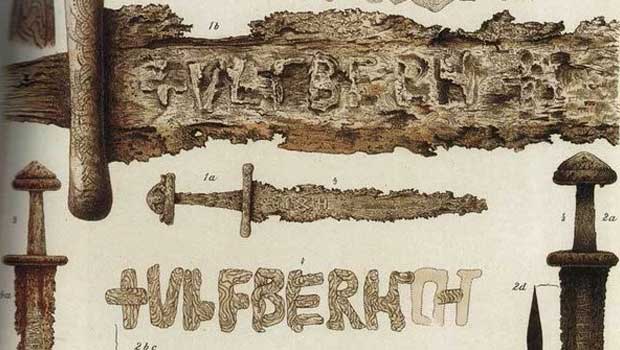One of the goals of our community content is to connect our players to For Honor via the many real world touchstones the game calls upon for inspiration. In this "Tale of Weapons" series of articles, we will explore legendary weapons that are either historical or mythological, which inspire our team's creation of the weapons wielded by the Knights, Vikings and Samurai of For Honor.

Drawings of Ulfberht swords found in Norway (Public domain)
Vikings were among the most feared warriors of all time, but only a few of them had the chance to fight with one of the best blades of their era, known as Ulfberht, made of crucible steel. Actually, Ulfberht was not one single sword but a series of medieval swords found in Europe with the +VLBERHT+ inscription engraved on the blades. It is estimated that around 170 of these swords were found, dating from the 9th – 11th centuries, and they were made by multiple bladesmiths throughout this time period. Made of metal so pure, these swords still baffle weapon experts today, who wonder what technology was used at that time to produce such high quality blades. Ulfberht were strong, but also light and flexible, making it the perfect weapon for melee combat. The flexibility allowed the sword to not get stuck in a shield or a piece of armor. But they were luxury items, costing far more than an axe or a spear. Only a few warriors could afford them. Despite their barbarian appearance, Vikings were ahead of their time in many ways. They were highly skilled navigators who apparently sailed as far as North America and Northern Asia. They were also great traders, and that may explain a part of the sword’s mystery. Ulfberhts are one-handed swords with pommels, assembled with double-edged straight blades. Vikings used to fight with the sword in one hand, combined with a shield in the other hand, creating a dangerous combination. Most Ulfberht swords were found in Norway, but some experts claim they may come from Germany, in the Taunus region, because of the high level of arsenic found in the iron.

Digital reconstruction of an Ulfberht sword (Wikimedia Commons)
Extremely rare and valuable, they were very sought-after weapons for the most elite Vikings. Apparently the blade was so sharp and the iron so strong, that you could cut through bones and other cheaper blades, shattering them like glass. Many Viking warriors were buried with their swords, making them easy to find in graves and burials by archeologists. What makes the sword still renowned and mysterious today is the thickness and purity of the blade. In the process of forging iron, the ore needed to be heated up to 3,000 degrees Fahrenheit to remove impurities. Considering that Ulfberht swords had almost no impurities and the medieval technology at that time didn’t allow iron to be heated at such a high level, we still don’t know exactly how blacksmiths forged them. Even today, this quality of blade is very difficult to reproduce.

Ulfberht sword (source: PBS)
Another theory states that the material and the know-how could come from the Middle East, as the Volga trading route between the Viking settlements and the Middle East opened at the same time the first Ulfberht swords appeared. The manganese and arsenic content found in the iron still suggests a European origin. Were they made by German monks? Imported from Middle East? Or made with the help of the Norse gods? We may never know, but this mystery is part of what makes the Ulfberht sword so legendary.
References:
EPOCH TIMES
ANCIENT ORIGINS
WIKIPEDIA

